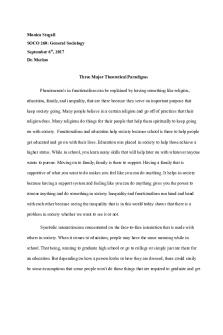Sociological Paradigms - sociology PDF

| Title | Sociological Paradigms - sociology |
|---|---|
| Author | Samantha Lagor |
| Course | First Year Seminar |
| Institution | Polk State College |
| Pages | 1 |
| File Size | 42.8 KB |
| File Type | |
| Total Downloads | 119 |
| Total Views | 147 |
Summary
a small assignment I did in sociology that breifly covered the sociological paradigms....
Description
There are three types of sociological paradigms: structural functionalism, conflict theory, and symbolic interactionism. Structural functionalism focuses on the functions or purpose of why we do things in our society. Functionalism is considered a macro perspective because it is a way of viewing society as a whole. An example of this paradigm is a family. One of the functions of a family is to have children to create the future of the society. The family will also raise the children to be social and to contribute to society. Another example of functionalism is any religious gatherings. Sociologists believe they are important to help share similar views, opinions, and morals throughout a group of people. Conflict Theory is very similar to Structural Functionalism by also being labeled as a macro perspective. Conflict Theory focuses on a power over resources, and what gives certain people power and other no power. A good example of this is feudalism which existed in the 1800s. There were some people who were born into nobility and never had to worry about starvation, and the others not born into it that lived as peasants, or the working class. The workers would grow enough food to have a surplus amount, but instead of it being equally split up, those with higher power, the nobles, kept it for themselves. We have created a social constraint for ourselves and “the way we labor is organized leads to massive inequalities.” (Karl Marx & Conflict Theory). The last paradigm is Symbolic Interactionism. Symbolic Interactionism is about how certain symbols and words have meanings to them. Unlike the other two paradigms, this one is a micro perspective, it focuses on the social interactions on a small scale. Examples of this are the simple phrases we use to greet each other such as, “hello” and “how are you?”. “These phrases are like ready-made greeting cards that we employ in social situations, often when we don’t know what else to say.”(Karen Sternheimer)....
Similar Free PDFs

Programming Paradigms
- 4 Pages

Sociological-imagination
- 2 Pages

Sociological autobiography
- 3 Pages

Educational Models and Paradigms
- 109 Pages

Paradigms in Nursing Research
- 3 Pages

Current Paradigms in Psychopathology
- 18 Pages

The Three Paradigms(1)
- 19 Pages

Paradigms in Geography
- 14 Pages

Paradigms IN Geography
- 19 Pages
Popular Institutions
- Tinajero National High School - Annex
- Politeknik Caltex Riau
- Yokohama City University
- SGT University
- University of Al-Qadisiyah
- Divine Word College of Vigan
- Techniek College Rotterdam
- Universidade de Santiago
- Universiti Teknologi MARA Cawangan Johor Kampus Pasir Gudang
- Poltekkes Kemenkes Yogyakarta
- Baguio City National High School
- Colegio san marcos
- preparatoria uno
- Centro de Bachillerato Tecnológico Industrial y de Servicios No. 107
- Dalian Maritime University
- Quang Trung Secondary School
- Colegio Tecnológico en Informática
- Corporación Regional de Educación Superior
- Grupo CEDVA
- Dar Al Uloom University
- Centro de Estudios Preuniversitarios de la Universidad Nacional de Ingeniería
- 上智大学
- Aakash International School, Nuna Majara
- San Felipe Neri Catholic School
- Kang Chiao International School - New Taipei City
- Misamis Occidental National High School
- Institución Educativa Escuela Normal Juan Ladrilleros
- Kolehiyo ng Pantukan
- Batanes State College
- Instituto Continental
- Sekolah Menengah Kejuruan Kesehatan Kaltara (Tarakan)
- Colegio de La Inmaculada Concepcion - Cebu






